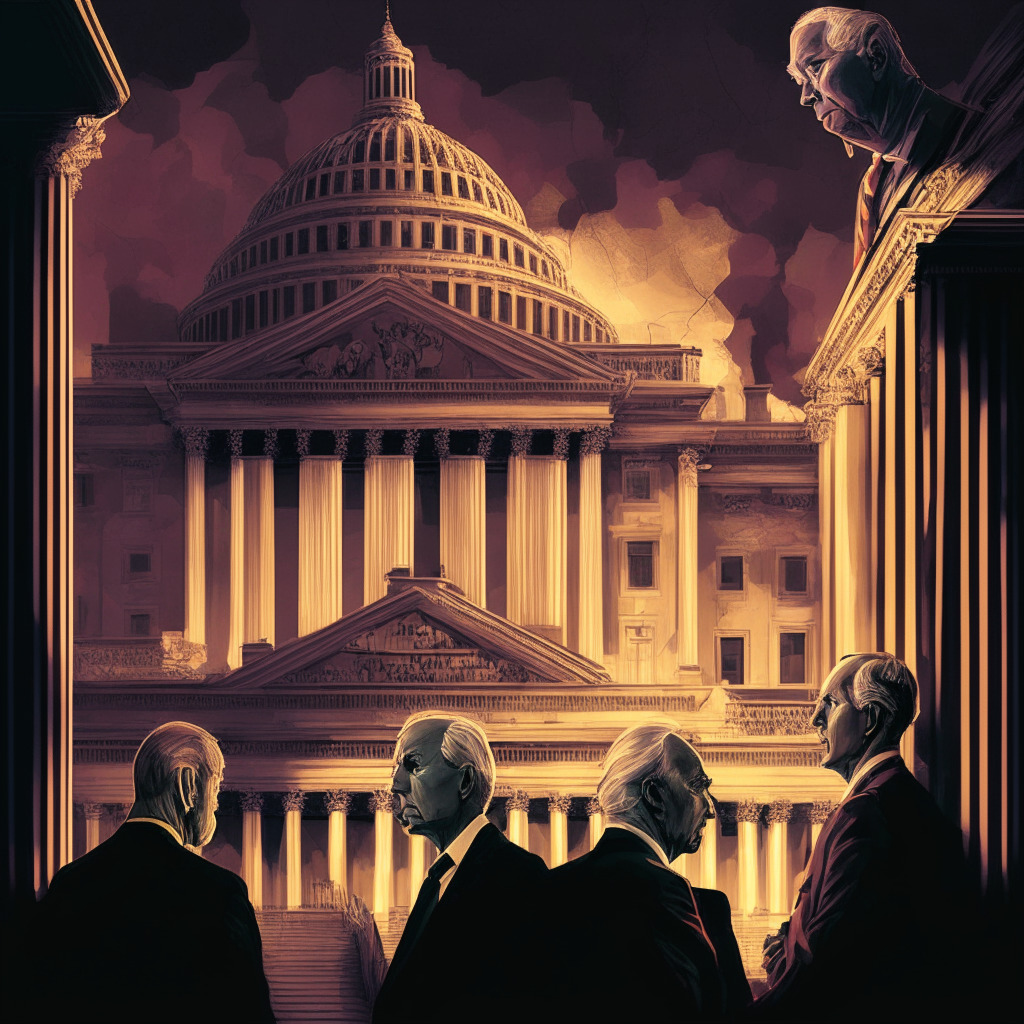Consumer protection groups in the EU are urging regulators to investigate AI models behind popular chatbots like OpenAI’s ChatGPT due to potential risks and vulnerabilities. As AI regulations tighten globally, balancing AI benefits with consumer rights and safety is crucial for creating a comprehensive regulatory framework and fostering public trust.
Search Results for: Biden
Urgency for US Stablecoin Bill: Balancing Innovation and Regulation in Digital Currency Future
Circle’s CEO Jeremy Allaire urges US lawmakers to prioritize a stablecoin bill amid global advancements in digital currency regulations. The bill, titled “The Future of Digital Assets”, aims to foster a vibrant and safe digital assets market while balancing innovation and financial stability.
Taxbit Layoffs Amid Expansion Plans: Analyzing the Crypto Industry’s Struggle with Regulation
Taxbit, a crypto tax compliance software company, laid off 80 workers (40% of its staff) and announced the departure of CEO Austin Woodward. Lindsey Argalas, a former Intuit executive, replaced him. The company plans to re-expand in the UK and EU amidst a more complex regulatory environment and growing taxation focus in the crypto space.
Will Democrats Lose Young Crypto Voters? Analyzing the Winklevoss Claims and the Political Divide
The Winklevoss twins suggest that the Democratic Party’s perceived “war on crypto” could cost them key young voters in upcoming elections. Young people, who largely supported Democrats previously, make up a significant portion of cryptocurrency adopters. It remains uncertain how important crypto policy is to young voters compared to other issues.
Crypto Wash Trading Regulations: Balancing Tax Evasion Prevention and Innovation
Democrats push for tighter regulations on cryptocurrency wash trading to address tax evasion, as the IRS doesn’t currently treat cryptocurrencies as securities. Regulators aim to balance fostering innovation while protecting investors and the broader financial system from fraudulent activities.
Crypto Tax Regulations: Legitimizing the Industry vs Hindering Growth and Privacy
US Congressmen Brad Sherman and Stephen Lynch urge for crypto tax regulations, highlighting tax evasion concerns in the industry. Regulations could legitimize crypto and encourage adoption, but critics argue it may hinder growth and limit decentralization benefits.
Dorsey Backs Pro-Crypto Kennedy for 2024 Presidency: Blockchain Future vs Vaccine Skepticism
Twitter co-founder Jack Dorsey endorses pro-crypto presidential candidate Robert F. Kennedy, Jr. for the 2024 elections. Kennedy aims to protect individual rights to hold and use Bitcoin, resist government intrusion, and end the corrupt merger of state and corporate power.
Asian Markets Rally Amid Fed Expectations: How Bitcoin Navigates Inflation and Volatility
Asian stock markets rally amid anticipation of the US Federal Reserve holding off on interest rate hikes, while Bitcoin trades below $27,000. Inflation concerns may lead to a surge in Bitcoin value as a safe haven. Investors should conduct thorough research before entering the volatile cryptocurrency market.
Crypto in Politics: Jack Dorsey Backs Pro-Bitcoin Presidential Candidate RFK Jr.
Twitter CEO Jack Dorsey supports pro-crypto Democrat candidate Robert F. Kennedy Jr., who accepts Bitcoin donations for his presidential campaign. Kennedy criticizes CBDCs as tools to suffocate dissent and condemns a proposed 30% tax on crypto mining.
US Crypto Mining Tax Proposal: Impacts, Reactions, and the Future of Regulation
The proposed Digital Assets Mining Energy (DAME) tax, which aimed to impose a 10-30% tax on electricity used for crypto mining, failed to make its way into a U.S. debt ceiling bill. The tax’s potential impact on global emissions, renewable energy incentives, and the uncertain regulatory environment stirred debates within the crypto community, highlighting the need for governments to embrace and properly regulate the evolving blockchain future.
Debt Ceiling Deal Impact: Crypto Stability Amid Recession Fears
Positive market sentiments in global stock and crypto markets follow the Biden-McCarthy Debt Ceiling Deal and U.S. Federal Reserve’s potential interest rate decision. However, risks remain for volatile assets like cryptocurrencies due to uncertain macroeconomic conditions, regulatory challenges, and weak technical charts. Conduct thorough research before investing in cryptocurrencies.
Federal Reserve’s Next Move: Impact on Bitcoin and Market Volatility
The jobs report and Federal Reserve’s potential rate hikes, alongside a recently passed debt ceiling deal, play crucial roles in shaping the overall market mood. With the VIX index at a 52-week low, cheaper options prices and macroeconomic events could significantly impact markets.
Ethereum Staking Skyrockets: Impact of US Debt Ceiling and High APR on ETH Popularity
The record surge in Ethereum staking in May, reaching an all-time high of 2.96 million ETH, was attributed to factors such as the US debt ceiling saga, declining confidence in the U.S. dollar, banking crises, and high annual percentage rates (APR) offered on ETH staking.
Crypto and Stocks Rally: US Debt Ceiling Deal and Fed’s Potential Rate Hike Skip Impact
The U.S. Senate’s passage of the Biden-McCarthy debt ceiling deal led to a recovery in crypto and stock markets, with Bitcoin and Ethereum prices rallying. However, low “institutional excitement” and volatile market conditions persist, highlighting the need for thorough research before investing.
Debt Ceiling Raise: Short-Term Relief, Long-Term Crypto Market Impact and Uncertainty
The U.S. Senate’s decision to raise the debt ceiling has averted a potential default, positively impacting markets, including the cryptocurrency market. However, long-term repercussions remain uncertain, with concerns about quantitative tightening and tightening liquidity. Investors and crypto enthusiasts should closely monitor market developments before making investment decisions.
Texas Bitcoin Mining Boom: Supportive Legislation and State-Level Tug of War
Texas embraces bitcoin mining as legislators pass supportive bills, SB 1929 and HB 591, solidifying the state’s position as a premier destination for the industry. However, future federal-level regulation remains uncertain, with individual states currently leading policy development.
2024 Presidential Election: Crypto Regulation Takes Center Stage in Debates
The 2024 US presidential election could witness discussions on crypto market regulation taking center stage, impacting the US’s position as a global crypto hub. Prospective candidates like Ron DeSantis and Robert F. Kennedy Jr. openly support digital asset trading freedom, while JP Morgan CEO Jamie Dimon’s potential candidacy raises questions about cryptocurrency’s role in the American financial landscape.
Hong Kong Crypto Regulations and IRS Access to Coinbase Data: Impact on Bitcoin Market
Bitcoin’s price tumbled 2% amid Hong Kong’s crypto regulatory regime launch and other factors such as macro, technical, and regulatory challenges. Investors have been offloading and moving Bitcoin off Coinbase, affecting the market alongside global economic developments like the US debt ceiling deal and interest rate discussions.
Debt Ceiling Crisis Impact on Crypto: Potential Rate Hikes and Decentralized Solutions
The recent passing of the debt ceiling bill has impacted the cryptocurrency market, causing a 3% decline in Bitcoin’s price. As the deadline approaches, potential rate hikes and political uncertainties might bring further volatility, while also leading investors to consider alternative investment options, such as cryptocurrencies, and pushing for decentralized financial solutions.
2024 US Election and Crypto: Regulation vs Innovation Showdown
The US cryptocurrency regulatory stance becomes a significant topic as the 2024 presidential election approaches, with figures like Florida Governor Ron DeSantis discussing the possibility of banning CBDC use in Florida. The current administration’s enforcement actions, ongoing lawsuits, and heavy regulation could hinder innovation and force businesses to seek more open environments outside the US.
Debt Ceiling Negotiations and Cryptocurrency: Seeking the Perfect Balance
The House of Representatives votes on postponing the debt ceiling until 2025 through the Fiscal Responsibility Act of 2023. This bipartisan agreement will impose limits on discretionary spending, but its impact on growth, innovation and the cryptocurrency sector requires a delicate balance between fiscal responsibility and flexibility.
Balancing AI Innovation and National Security: China and US Strive for Tech Dominance
Chinese officials express concern about artificial intelligence (AI) posing national security risks. As AI development accelerates, China pushes for tighter controls and regulatory “guardrails” to manage potential negative consequences, while still fostering innovation.
Navigating Crypto Amid Federal Reserve’s Liquidity Tightening and Debt Ceiling Debates
Crypto enthusiasts should note Cleveland Fed President Loretta Mester’s support for liquidity tightening and consistent interest rate policy, as her comments impacted Bitcoin’s value. The market’s response demonstrates the significance of global economic events and Federal Reserve policy decisions on the cryptocurrency landscape.
Bitcoin’s 2.5% Dip: Analyzing Market Trends, Binance Australia, and Future Outlook
Bitcoin’s value dipped 2.50% possibly due to Binance Australia users selling at a lower rate, resulting in a 21% price drop. Meanwhile, Tether focuses on sustainable energy for Bitcoin mining, and market participants closely watch debt ceiling developments and China’s web3 innovation plan.
Debt Ceiling Deal Impact on Bitcoin: Crypto Market Reaction & Future Outlook
Bitcoin steadied after dropping below $28,000 due to progress on a debt ceiling deal, while government debt may prove favorable for the crypto market. Analysts suggest bitcoin’s resilience amid monetary tightening could be due to factors like store-of-value, NFTs, and supply/demand dynamics.
US Debt Ceiling Chaos Spurs Diversification into Cryptos: Analyzing WSM, QNT, and More
Amid uncertainty over the US debt ceiling, market participants explore diversification into cryptocurrencies such as WSM, QNT, ECOTERRA, INJ, YPRED, LDO, and DLANCE. Enthusiasts consider the environmentally-focused web3 initiative, Ecoterra, an integral part of the global climate change strategy.
Bitcoin’s Growing Pains: Balancing Net-Zero Emissions Commitments and Crypto’s Future
Bitcoin mining’s energy consumption risks conflicts with global net-zero emission commitments, potentially leading to price decline and regulatory challenges. Governments should focus on greening their grids while the crypto industry embraces renewable energy and sustainable practices to stay on a secure footing amidst growing environmental concerns.
Bitcoin ETFs Surge 5%: Institutional Buying and Debt Ceiling Deal Fuel Crypto Rally
Multiple Bitcoin ETFs, including ProShares Bitcoin Strategy ETF (BITO) and Valkyrie Bitcoin Strategy ETF (BTF), witnessed a 5% jump in pre-market hours on Tuesday, indicating institutional buying and anticipation of a BTC price rally. The recent debt ceiling agreement between President Joe Biden and Republicans eliminated a 30% tax on Bitcoin mining, positively affecting markets.
Crypto Miners Dodge Tax Bullet in US Debt Ceiling Deal: Pros, Cons, and Main Conflict
The latest U.S. debt ceiling bill draft potentially eliminates a proposed 30% tax on electricity used by cryptocurrency miners, as part of President Biden’s FY2024 budget. The legislation, aiming to prevent a government debt default, still needs congressional approval.
Debt Ceiling Dilemma: Can Meme Coins Thrive Amid Crypto Market Uncertainty?
The US debt ceiling crisis may negatively impact traditional cryptocurrencies like Bitcoin, but meme coins like Wall Street Memes (WSM) could potentially benefit. As WSM’s value is tied to internet memes and not dependent on dollar liquidity, it may navigate the challenging environment more successfully.
Crypto Mining Tax Shelved: Balancing Innovation, Regulation, and Sustainability Debate
The proposed Digital Asset Mining Energy excise tax (DAME) on cryptocurrency mining is absent from the recent US debt ceiling deal, stirring debates. While proponents argue DAME could generate revenue and promote eco-friendly practices, critics warn against stifling the growing industry with taxes.
Debt Ceiling Agreement Blocks Crypto Mining Tax: A Win for the Industry or Environmental Setback?
The recent U.S. debt ceiling agreement has notably blocked the proposed Digital Asset Mining Energy (DAME) excise tax, preventing a 30% tax imposition on cryptocurrency mining firms. This outcome, seen as a victory for the crypto industry, has sparked debates around the environmental impact of crypto mining operations and the importance of addressing energy consumption concerns for a sustainable future.































